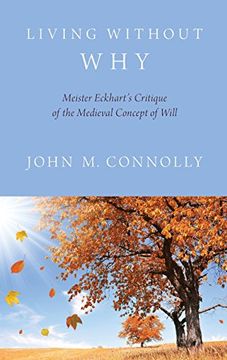Share
Living Without Why: Meister Eckhart's Critique of the Medieval Concept of Will (in English)
John M. Connolly (Author)
·
Oxford University Press
· Hardcover
Living Without Why: Meister Eckhart's Critique of the Medieval Concept of Will (in English) - John M. Connolly
$ 125.00
$ 169.64
You save: $ 44.64
Choose the list to add your product or create one New List
✓ Product added successfully to the Wishlist.
Go to My WishlistsIt will be shipped from our warehouse between
Thursday, May 30 and
Friday, May 31.
You will receive it anywhere in United States between 1 and 3 business days after shipment.
Synopsis "Living Without Why: Meister Eckhart's Critique of the Medieval Concept of Will (in English)"
What does it mean to "live without why"? This was the advice of Meister Eckhart (ca. 1260-1328), both in his Latin treatises to philosophers and theologians and in his German sermons to nuns and ordinary lay persons. He seems to have meant that we should live and act out of justice or goodness and not in order to gain some reward for our deeds. This message was received with indignation by the Church hierarchy and was condemned by the Pope in 1329. How did Eckhart come to formulate it? And why was it so controversial?John M. Connolly addresses these questions by locating Eckhart's thinking about how to live within the mainstream synthesis of Christian and classical thought formulated in the High Middle Ages. He calls the classical Greek moral consensus "teleological eudaimonism," according to which correct living coincides with the attainment of happiness (eudaimonia). This involves living a life marked by the practice of the virtues, which in turn requires a consistent desire for the correct goal in life. This desire is the core notion of will. In late antiquity Augustine drew on this tradition in formulating his views about how Christians should live. This required grafting onto classical eudaimonism a set of distinctively scriptural notions such as divine providence, original sin, redemption, and grace. In the 13th century these ideas were systematized by Thomas Aquinas in his will-centered moral theology.Eckhart claimed that this tradition was profoundly mistaken. Far from being a wild-eyed mystic or visionary, he argued trenchantly from classical philosophical principles and the Christian scriptures. Connolly proposes that Eckhart's views, long obscured by the papal condemnation, deserve reconsideration today.
- 0% (0)
- 0% (0)
- 0% (0)
- 0% (0)
- 0% (0)
All books in our catalog are Original.
The book is written in English.
The binding of this edition is Hardcover.
✓ Producto agregado correctamente al carro, Ir a Pagar.

